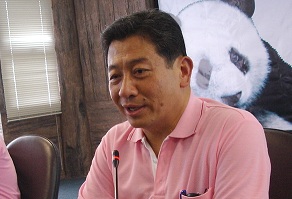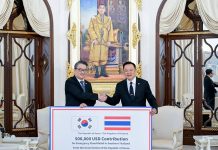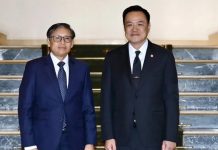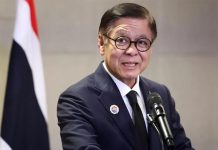CHIANG MAI, May 28 — The Cambodian government has rejected a plan proposed by the United Nations Educational, Scientific and Cultural Organisation (UNESCO) to delay the consideration of management plan for Preah Vihear temple until Thailand and Cambodia finish border demacation, said Thai Minister of Natural Resources and Environment Suwit Khunkitti on Saturday.
Speaking to journalists after returning from a special meeting organised by UNESCO held earlier this week in Paris, which ended in deadlock, Mr Suwit, who headed the Thai delegation at the meeting, said the Cambodian delegates led by Deputy Prime Minister Sok An was against the idea of postponement of management plan for Preah Vihear, which was earlier listed as World Herritage.

He said a fresh talks on the issue between Thailand and Cambodia may be organised again just before the 25th session of UNESCO’s World Heritage Committee (WHC) scheduled to be held between June 19-29.
Delegations from Thailand and Cambodia had spent three days on bilateral and individual consultations at UNESCO but failed to reach any agreement on disputes over the Preah Vihear temple.
The UNESCO-organised meeting was scheduled prior to the meeting of the World Heritage Committee in an attempt to resolve the two countries differences, after Cambodia opposed Thailand’s request that the committee defer consideration of Cambodia’s one-party Preah Vihear management plan until the International Court of Justice rules on its complaint and awaiting progress on border demarcation at the Thai-Cambodian General Border Committee (GBC) meeting.
Last month Cambodia asked the court to clarify a 1962 ruling on the ancient Hindu temple on its disputed border with Thailand following recent deadly armed clashes between the two neighbouring countries.
Members of the WHC and UNESCO director-general Irina Bokova are scheduled to meet between June 19-29 in France, after this week’s discussions on the management plan for areas surrounding the World Heritage-listed Preah Vihear temple ended without any headway, while Thailand was able to convince the world agency to postpone consideration of the disputed issue until border demarcation work is completed.
The Cambodian delegates were against Thailand’s proposal on the postponement and also asked to amend two or three points. Thailand has to see whether the changes, if made, would have any impact on the country with regards to the disputed land, Mr Suwit said.
He reiterated that talks on the framework of the two countries’ General Border Committee (GBC) must be clear first before next month’s WHC session in Paris.
Mr Suwit insisted that border demarcation work must also be completed before the management plan for the disputed area is finalized.
The Paris-based UN cultural branch said in a statement following the meeting between Mr Suwit and Mr Sok An that the UNESCO Director-General Bokova expressed her disappointment on Friday after Thai and Cambodian delegations failed to reach an agreement on disputes over the Temple of Preah Vihear.
Though the two parties had “affirmed their will to protect and preserve the Temple,” Bokova voiced “disappointment at the fact that no agreement was reached between the Parties on concrete steps ahead of the forthcoming World Heritage Committee session,” said the statement.
“I appeal to both countries to pursue efforts towards achieving a common agreement before the World Heritage Committee session in June in a spirit of cooperation and constructive dialogue,” the UNESCO chief said.
The International Court of Justice in 1962 ruled that the 11th century Preah Vihear temple belonged to Phnom Penh, while the UNESCO named it a World Heritage site in July 2008 after Cambodia unilaterally applied for the status. Clashes in the area have occurred frequently since then, as both countries claim a 4.6-square-kilometre patch of land near the cliff-top temple. (MCOT online news)




